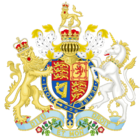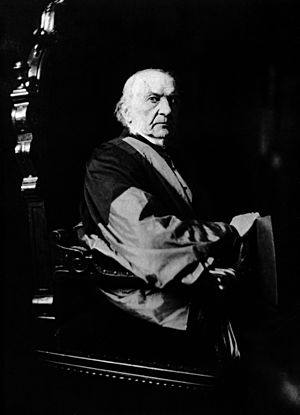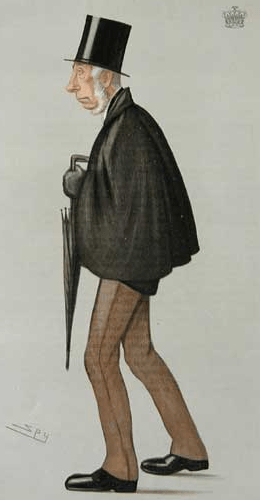Land Law (Ireland) Act 1881 facts for kids

|
|
| Long title | An Act to further amend the Law relating to the Occupation and Ownership of Land in Ireland, and for other purposes relating thereto. |
|---|---|
| Citation | 44 & 45 Vict. c. 49 |
| Introduced by | William Gladstone |
| Territorial extent | Ireland |
| Dates | |
| Royal assent | 22 August 1881 |
| Other legislation | |
| Repealed by | Property (Northern Ireland) Order 1997 |
| Relates to | Land Acts (Ireland) |
| Status | |
| Republic of Ireland | Amended |
| Northern Ireland | Repealed |
| History of passage through Parliament | |
| Text of statute as originally enacted | |
The Land Law (Ireland) Act 1881 was an important law passed by the Parliament of the United Kingdom in 1881. It was the second major "Irish land act" aimed at improving the lives of farmers in Ireland. This act tried to fix long-standing problems between landlords (who owned the land) and tenants (who rented and farmed it).
Why the Land Law Act Was Needed
Problems with the 1870 Land Act
The Liberal government, led by William Ewart Gladstone, had passed the Landlord and Tenant (Ireland) Act 1870. This earlier law was meant to solve issues between tenants and landlords in Ireland. However, many people felt it did not work as planned. Because of this, a new political group called the Home Rule League formed in 1873. This group quickly gained support, winning many seats in Parliament that used to belong to the Liberal Party.
Gladstone Learns About Ireland
Gladstone visited Ireland in the autumn of 1877. He spent almost a month in County Wicklow and Dublin. He made sure to visit "farms, cottages & people" and talked with Irish people. He wanted to understand their lives better. He even wrote in his diary that he wished he had seen more of "Ireland" itself, rather than just the English officials in Dublin.
New Government, New Challenges
The Liberal Party won the election in 1880. The government discussed renewing a strict law called the Coercion Act. They also thought about changing the 1870 Land Act to help people buy land. However, they decided not to renew the Coercion Act right away. They also felt changing the Land Act was too complicated for that year.
Gladstone learned that many tenants were still being evicted from their homes. He realized there was an urgent need to look into this problem.
The Bessborough Commission Report
In June 1880, a special group called a Royal Commission was set up. It was led by Lord Bessborough. This group was tasked with studying how the 1870 Land Act was working. They met many times between September 1880 and January 1881. They listened to many people, including landlords, agents, and over 500 tenants.
The Commission looked at farming in Ireland. They also studied how the "agricultural depression" was affecting farmers. This depression was caused by lots of cheap food coming from places like North America. The Commission's report suggested three main ideas to help tenants. These ideas became known as "the three Fs":
- Fixity of tenure: Tenants should have a secure right to stay on their land.
- Fair rents: Rents should be set at a reasonable price.
- Free sale: Tenants should be able to sell their right to farm the land to someone else.
Gladstone's Decision for a New Act
By the end of 1880, Gladstone saw Ireland's situation as the biggest concern. He was worried by the Commission's suggestions. He was also upset that Irish landlords seemed unable to deal with the Irish National Land League during the "Land War". To balance out the idea of using strict laws, Gladstone believed a new Land Act was necessary. The government agreed.
On March 31, 1881, the Duke of Argyll, who was a landlord himself, resigned from the government. He did this to protest against the new Land Bill.
Gladstone introduced the new Bill in Parliament on April 7. He said that the old laws in Ireland recognized a tenant's right to the land. He called this a "joint proprietorship," meaning tenants had a shared ownership. He hoped that one day Ireland would be able to have complete freedom in land agreements. However, he admitted that Ireland was not ready for that yet. He focused on the idea of a "Land Court" as the most important part of the Bill. This court would help bring order and stability to land relations in Ireland.
The Irish nationalist politician John Dillon commented on April 13. He feared the Act was designed to weaken the Land League.
What the Act Said
The Land Law (Ireland) Act 1881 included the demands for the "three Fs."
Fair Rents and Secure Tenure
- Land Courts: Special courts were created. Landlords or tenants could ask these courts to set a "judicial rent" for the land.
- Fixed Rents: Once a rent was set by the court, it would stay the same for 15 years. If a landlord and tenant agreed on a rent themselves and registered it with the court, that rent would also be fixed for 15 years.
Help for Buying Land
The Act also tried to help tenants buy their land. The amount of money the government would lend for land purchases was increased. It went from two-thirds to three-quarters of the total price. This money had to be paid back over 35 years.
How the Act Changed Things
Dual Ownership of Land
The Act created a system of "dual ownership" of land. This meant that both the landlord and the tenant had certain rights to the land. The landlord became more like someone who just collected rent. This change made landlords more willing to sell their land later on.
Impact on Tenants
The financial help offered for buying land was not enough for most tenants. They still could not afford to buy their farms. Because of this, only a few hundred land holdings were bought under this Act.
For tenants in Ulster, a region in Ireland, the Act seemed to meet all their demands. They quickly used the Act to adjust their rents. After a few years, some land protests started again, but they were not as widespread. The Act also made it less likely that Protestant tenants in Ulster would join with Catholic tenants in the rest of Ireland. Such unity had been tried before, like in the Tenant Right League of the 1850s.
 | Delilah Pierce |
 | Gordon Parks |
 | Augusta Savage |
 | Charles Ethan Porter |



